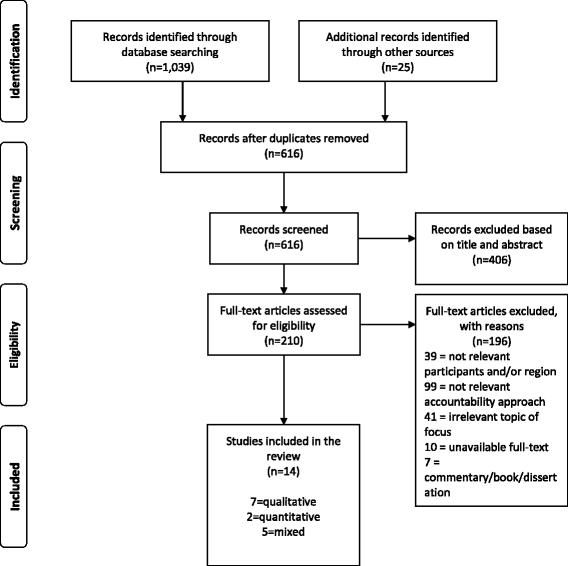Improving social accountability processes in the health sector in sub-Saharan Africa: a systematic review
- PMID: 29653531
- PMCID: PMC5899409
- DOI: 10.1186/s12889-018-5407-8
Improving social accountability processes in the health sector in sub-Saharan Africa: a systematic review
Abstract
Background: Social accountability is a participatory process in which citizens are engaged to hold politicians, policy makers and public officials accountable for the services that they provide. In the Fifteenth Ordinary Session of the Assembly of the African Union, African leaders recognized the need for strong, decentralized health programs with linkages to civil society and private sector entities, full community participation in program design and implementation, and adaptive approaches to local political, socio-cultural and administrative environments. Despite the increasing use of social accountability, there is limited evidence on how it has been used in the health sector. The objective of this systematic review was to identify the conditions that facilitate effective social accountability in sub-Saharan Africa.
Methods: Electronic databases (MEDLINE, PsycINFO, Sociological Abstracts, Social Sciences Abstracts) were searched for relevant articles published between 2000 and August 2017. Studies were eligible for inclusion if they were peer-reviewed English language publications describing a social accountability intervention in sub-Saharan Africa. Qualitative and quantitative study designs were eligible.
Results: Fourteen relevant studies were included in the review. The findings indicate that effective social accountability interventions involve leveraging partnerships and building coalitions; being context-appropriate; integrating data and information collection and analysis; clearly defined roles, standards, and responsibilities of leaders; and meaningful citizen engagement. Health system barriers, corruption, fear of reprisal, and limited funding appear to be major challenges to effective social accountability interventions.
Conclusion: Although global accountability standards play an important guiding role, the successful implementation of global health initiatives depend on national contexts.
Keywords: Citizen engagement; Community; Enabling factors; Limiting factors; Social accountability; Sub-Saharan Africa.
Conflict of interest statement
Ethics approval and consent to participate
Not applicable.
Competing interests
The authors declare that they have no competing interests.
Publisher’s Note
Springer Nature remains neutral with regard to jurisdictional claims in published maps and institutional affiliations.
Figures
References
-
- Mubyazi GM, Bloch P, Byskov J, Magnussen P, Bygbjerg IC, Hansen KS. Supply-related drivers of staff motivation for providing intermittent preventive treatment of malaria during pregnancy in Tanzania: evidence from two rural districts. Malar J. 2012;11:48. doi: 10.1186/1475-2875-11-48. - DOI - PMC - PubMed
-
- Ridde V. Per diems undermine health interventions, systems and research in Africa: burying our heads in the sand. Tropical Med Int Health. 2010;15(7):E1-E4. - PubMed
Publication types
MeSH terms
LinkOut - more resources
Full Text Sources
Other Literature Sources


